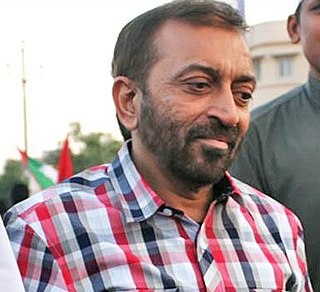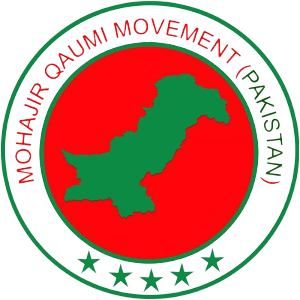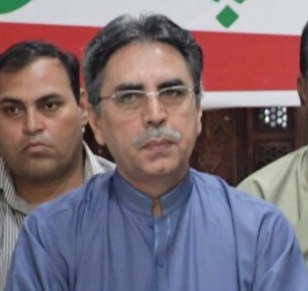
The Muttahida Qaumi Movement (MQM), previously known as Muhajir Qaumi Movement, is a secular political party in Pakistan that was founded by Altaf Hussain in 1984. Currently the party is split between 2 main factions. MQM-London faction is controlled by Altaf Hussain from London, while MQM-Pakistan is run by Khalid Maqbool Siddiqui based in Pakistan. Its electoral symbol was a kite.
Altaf Hussain is a British Pakistani politician who is known as the founder of the Muttahida Qaumi Movement. He holds United Kingdom citizenship and has been living in exile in the UK since the start of Operation Clean-up. Since 2015, he has been a fugitive from the Anti Terrorism Court of Pakistan on the charges of murder, targeted killing, treason, inciting violence and hate speech. He went on trial in the UK in January 2022 for promoting terrorism and unrest through hate speech in Pakistan, and was acquitted the next month. He had fled the country in 1992 after a crackdown against his party was launched.
Azeem Ahmed Tariq was a Pakistani politician who was the Chairman and one of the founding members of MQM and its student wing APMSO. The party was formed to fight for the rights of the Mohajir people in Sindh, who were immigrants from India during the Indo-Pakistan split.

The All Pakistan Muttahida Students Organization is a Pakistani student organization notable for creating a political party: the Mohajir Quami Movement, now called the Muttahida Qaumi Movement (MQM).

Muhammad Farooq Sattar is a Pakistani politician who is the leader of the Muttahida Qaumi Movement-Pakistan.

Syed Faisal Ali Subzwari is a Pakistani politician and senior leader of Muttahida Qaumi Movement – Pakistan. He was elected as a member of the Provincial Assembly of Sindh on the ticket of MQM-P in 2013 Pakistani general election and has served as the opposition leader in Sindh Assembly.

Operation Clean-up, also known as Operation Blue Fox, was an armed military intelligence program led by the Sindh Police and Pakistan Rangers, with an additional assistance from the Pakistan Army and its related intelligence agencies. Planned by the FIA, Intelligence Bureau and launched the directives of Prime Minister Nawaz Sharif in 1992, the program was more strictly pursued by upcoming Prime Minister Benazir Bhutto in 1993–94, as part of her internal policies.
There are or have been a number of separatist movements in Pakistan based on ethnic and regional nationalism, that have agitated for independence, and sometimes fighting the Pakistan state at various times during its history. As in many other countries, tension arises from the perception of minority/less powerful ethnic groups that other ethnicities dominate the politics and economics of the country to the detriment of those with less power and money. The government of Pakistan has attempted to subdue these separatist movements, which have included those in Bangladesh, the Baloch Liberation Front (BLF) in Balochistan; the "Sindhudesh" movement in Sindh province; "Balawaristan" in Gilgit-Baltistan; Jinnahpur and Muhajir Sooba movement for muhajir immigrants from India.

The Mohajir Qaumi Movement Pakistan formerly known as Mohajir Qaumi Movement (Haqiqi), MQM-Haqiqi is a political party claiming to represent the Mohajir in Sindh, Pakistan whose leader is Afaq Ahmed.

Muttahida Qaumi Movement (Pakistan) (Urdu: متحدہ قومی موومنٹ (پاکستان)Muttaḥidah Qọ̄mī Mūwmaṅṫ Pākistānabbr.MQM-P) is a social liberal, Muhajir nationalist, and secularist political party. The leader of the party is Khalid Maqbool Siddiqui The party's symbol is the kite. It is mostly active in Karachi where up to majority of Muhajirs currently reside. The party aims to represent the Human rights of Muhajirs in Pakistan through peaceful and democratic struggle. The Party is a splinter faction of Muttahida Qaumi Movement – London.

In Pakistan, the term Muhajir refers to a diverse community originating from those Indian Muslims who, upon the partition of India in 1947, emigrated from India to settle in Pakistan. The community includes those immigrants' descendants, most of whom are settled in Karachi and other parts of urban Sindh. Following Pakistan's defeat in the Bangladesh Liberation War in 1971, a number of people from the former East Pakistan, predominantly ethnic Biharis, immigrated to Pakistan and have since comprised a part of the Muhajir community; those who have not immigrated are commonly known as Stranded Pakistanis in Bangladesh.
Imran Farooq was a British-Pakistani politician who was best known for his association with the Muttahida Qaumi Movement (MQM), a political party in Pakistan, of which he was a very senior member. He was also a founding member of the All Pakistan Muhajir Student Organization. Farooq held several positions in MQM and the Pakistani government. He lived in London in self-imposed exile from 1999 until he was murdered on 16 September 2010.

The Politics of Karachi takes place at the municipal, provincial and federal levels of the government. Karachi is a multiethnic, multilingual, multicultural and multireligious metropolitan city. The demographics of Karachi are important as most politics in Karachi is driven by ethnic politics.

Afaq Ahmed is a Pakistani politician who is the founder and leader of Muhajir Qaumi Movement (Haqiqi) (MQM-H), a break-away faction of the much larger than Muhajir Qaumi Movement which later became Muttahida Qaumi Movement (MQM).

Pak Sarzameen Party commonly known as PSP was a Pakistani political party founded by Syed Mustafa Kamal and Anis Kaimkhani on 23 March 2016. Ashfaq Mangi, Hassan Sabir, Iftikhar Alam and Shabbir Qaimkhani were senior members of the party. It merged into Muttahida Qaumi Movement – Pakistan on 12 January 2023.
The Sindh Mohajir Punjabi Pathan Muttahida Mahaz was a political party in the Pakistani province Sindh. The party was founded in 1969. Nawab Muzaffar Khan was the convenor of MPPM. In theory the party sought to serve as a political platform for Muhajirs, Pashtuns and Punjabis in Sindh, but in reality it functioned as a Muhajir political party as the Pashtun and Punjabi presence in the MPPM ranks was very limited. The party mobilized Urdu-speaking Muhajirs against the emerging Sindhi nationalist movement. It was led by Muhajir bureaucrats and businessmen. The main base of the MPPM was the city of Hyderabad.

Aamir Khan is a Pakistani politician who is the senior deputy convenor and leader of Muttahida Qaumi Movement – Pakistan.

Provincial elections were held in the Pakistani province of Sindh to elect the members of the 13th Provincial Assembly of Sindh on 25 July 2018, alongside nationwide general elections and three other provincial elections in Khyber Pakhtunkhwa, Balochistan and Punjab. The remaining two territories of Pakistan, AJK and Gilgit-Baltistan, were ineligible to vote due to their disputed status.

Persecution of Muhajirs or Human rights abuses against Muhajirs or Anti-Muhajir sentiment ranges from discrimination, mass killings, forced disappearances and torture, to political repression and suppression of freedom of speech of Muhajirs, mainly those belonging to the right wing party Muttahida Qaumi Movement – Pakistan.
MQM Militancy refers to militancy in Pakistan associated with the Muttahida Qaumi Movement party.













